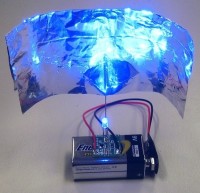Electric charge detector

Electric charge detector using 3 components only. Warns you when electrically charged objects appear. Runs for months on a battery.
This is ment as a handy tool to warn you for possible ESD risks.
Whenever you approach this small circuit with charged objects (like plastic bags) the LED will start lighting up. After a few seconds of inactivity the LED will slowly dim (see demo movie). If you move antistatic bags in front of it, it will not respond.
The minimalistic design uses only a JFET (transistor), a diode and a LED. It can detect a small charged plastic bag moving at a distance of 50cm. Over 25 of these circuits were build already. The circuit works best with the specified components.
(SMD versions shown here but also through-hole versions could be used)
For normal use a simple detector wire of a few cm is sufficient but you can add aluminium foil to the detector wire (see picture) to increase both the sensitivity and the optical effect.
The same circuit can also be used to create a sort of "fun mystery box" reacting on it's environment with glowing light variations (see movie link).
Whenever you approach this small circuit with charged objects (like plastic bags) the LED will start lighting up. After a few seconds of inactivity the LED will slowly dim (see demo movie). If you move antistatic bags in front of it, it will not respond.
The minimalistic design uses only a JFET (transistor), a diode and a LED. It can detect a small charged plastic bag moving at a distance of 50cm. Over 25 of these circuits were build already. The circuit works best with the specified components.
(SMD versions shown here but also through-hole versions could be used)
For normal use a simple detector wire of a few cm is sufficient but you can add aluminium foil to the detector wire (see picture) to increase both the sensitivity and the optical effect.
The same circuit can also be used to create a sort of "fun mystery box" reacting on it's environment with glowing light variations (see movie link).



Mises à jour de l'auteur